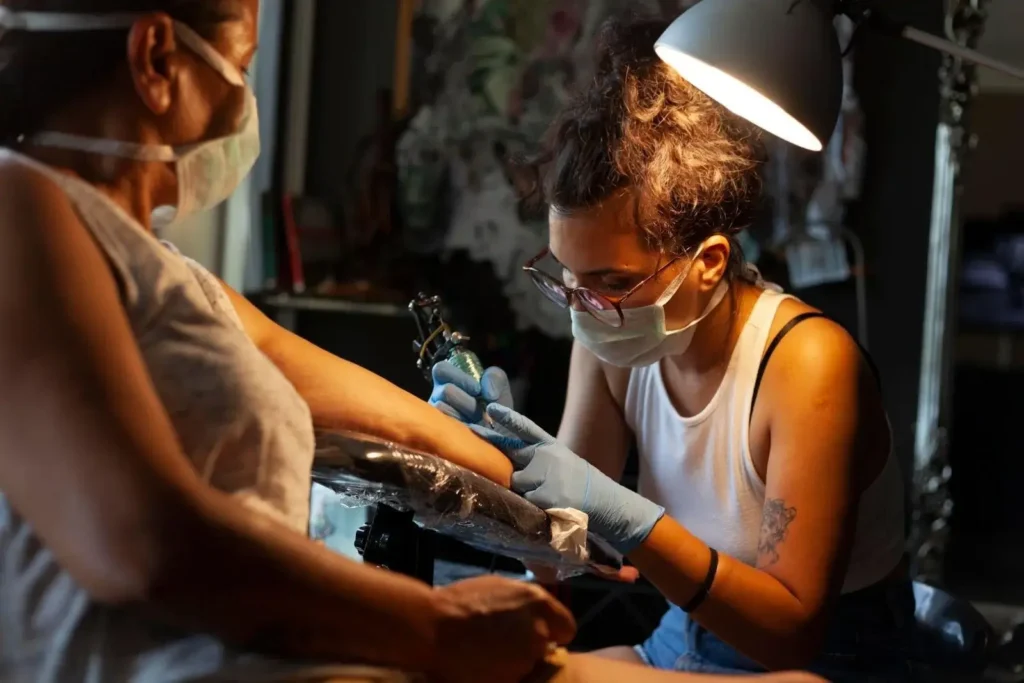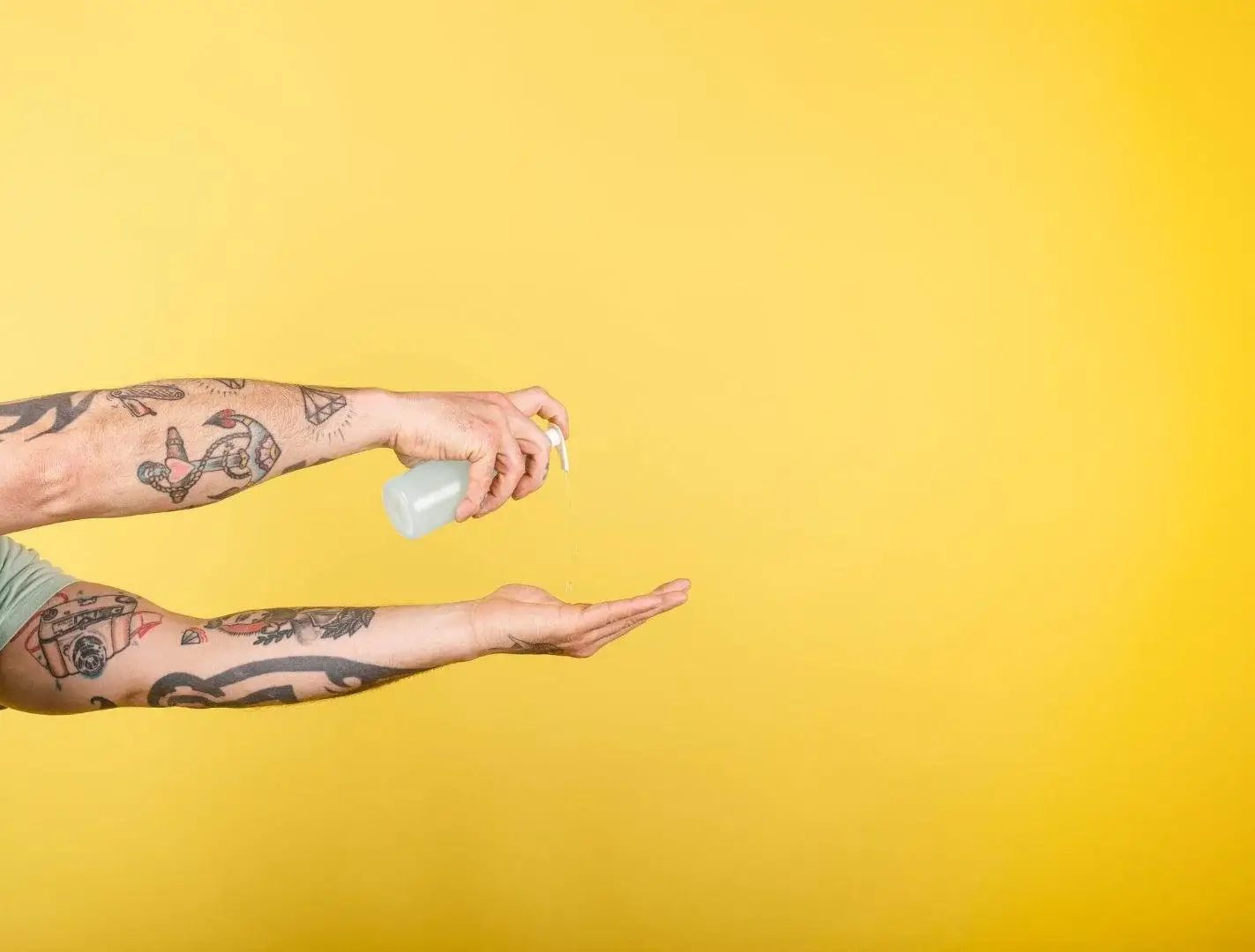It is a magnificent experience to get a tattoo. But there are some complications, especially when you do not follow the proper aftercare guidelines or have an ink allergy. If you feel your tattoo is not good and you are infected, it is important to take quick action to make sure that it is fully healed and you need to stop more complications. You need to know what infected tattoos look like, when to seek medical attention, and what steps to take to get healed, regardless of whether it is your first or thirty-fifth tattoo.
Important And Common Signs Of Tattoo Infection
It is not unusual for tattoos to become infected. it is important to recognize the signs of an infected tattoo in order to initiate immediate treatment. Here is the important and normal signs include:
- Around the tattoo area, there is persistent swelling, redness, weeping or warmth.
- There is severe discomfort or pain associated with a new tattoo, especially compared to the normal discomfort associated with it.
- The tattoo site is oozing pus or discharge.
- Inflammation of the tattoo area, including acne-like rashes, bumps, and blisters.
- Systemic infections are characterized by fever, chills, and other signs.
What Causes Tattoo Infections?
There are different types of reasons for tattoo infection here I share with you some reasons for tattoo infection that will help you to protect your tattoo from these infections if you know before getting a tattoo.

Weak Immune System
A weak immune system may make a person more susceptible to infections. Especially when they suffer from specific medical conditions or receive immunosuppressive therapy. People with weak immune systems face more difficulty fighting against the bacteria that come during the tattooing process. So these types of people are more careful before getting a tattoo to share their medical history with their artist.
Contaminated Equipment
If your artist uses tattooing equipment that is not completely sterilized, including ink, needles, or surfaces. It is the cause of infection that can develop as a result of bacteria and pathogens being introduced into the skin. We need to make sure that the studio where you go strictly follows sanitation equipment that reduces the risk of contamination.
Follow Not Proper Aftercare
When you get a tattoo and fail to follow the aftercare steps and do not follow them properly, it will increase the chance of infection. You need to ensure that you follow tattoo aftercare guidelines. Some steps involve moisturizing, cleaning your tattoo area, protecting it from the sun, and securing it from possible contaminants during the tattoo healing process.
Factors Related To The Environment
The skin area of the tattoo can become infected if it comes into contact with pollutants or pathogens from the environment, such as dirty water or unclean surfaces. You will need to avoid these types of activities, which may be until the tattoo has completely healed that may expose it to contaminants.
Basic Skin Conditions
The risk of developing infections after getting a tattoo may increase for people with pre-existing skin conditions, such as dermatitis, psoriasis, or eczema. By compromising the skin’s obstacle function, these conditions can cause bacterial invasions and inflammation. Also you can check the most painful tattoo spots.
Allergic Reactions
Some people who want to get a tattoo may face allergic reactions to tattoo ink or other tattooing materials which will cause of itching, inflammation, weeping of the tattooed area, and infection. It can happen instantly after getting a tattoo or may continue to develop as the body responds to a foreign substance.
How Do I Heal an Infected Tattoo?
Don’t forget that the advice given here cannot provide a medical diagnosis. If you are in doubt and feel that your tattoo is severely infected, I recommend the best option for you is to see a medical expert first before beginning the care process. Here we mention some important steps that can help you heal an infected tattoo
1. Clean Your Tattooed Area Properly
You need to maintain cleaning your tattooed area because it is important when you deal with an infected tattoo. I recommend washing your hands with warm water and soap before touching the tattooed skin area. You can also use light chemicals and fragrance-free soap to softly clean the infected tattoo and make sure to clean any discharges or debris. The skin can become irritated further if you scrub it too harshly.
2. Apply Topical Ointments
Your healthcare provider may recommend an over-the-counter antibiotic ointment or cream to treat infected tattoos. By applying these topical treatments, bacteria are stopped from growing and healing is accelerated. When you apply a thin layer to the affected area, follow the provided instructions that are mentioned on the product. To stop introducing additional bacteria, use clean hands or a sterile applicator.
3. Keep The Tattooed Area Dry
Tattoo infections can be exacerbated by moisture, so dry the infected area as much as possible. Taking a bath or swimming for a prolonged period is not recommended. Moreover, limit the use of occlusive dressings to help stop moisture from accumulating and hindering the healing process. Once you clean it you need to allow it to dry with natural air.
4. Dont Scratch Or Pick
You will experience too much dryness and itchy when your tattoo begins to heal. It tempts you to pick or itching at peeling skin. If you do it, your healing process is delayed and your infection is more dangerous. Don’t touch your tattoo with dirty hands and also protect it from sharp objects, because it will cause more damage to the skin. If your itching is not bearable, then tap the itching area with a soft hand instead of scratching.
5. Keep An Eye On Improvements
You need to monitor your tattoo for any changes whether it is an infected tattoo or any signs of improvement. Put your focus on infected symptoms including swelling, redness, drainage, or warmth, as these will be an indicator that the infection will be more damaged. It is important to seek medical attention immediately if your symptoms persist after a few days of home care or worsen. An appropriate treatment can be prescribed if necessary by your healthcare provider.
Frequently Asked Questions (FAQS)
How common are tattoo infections?
It is relatively rare for tattoos to become infected, but they can occur if proper care is not taken during or after the tattooing process.
Can I treat an infected tattoo at home?
Home remedies such as topical ointments and proper hygiene are usually sufficient for treating mild infections. It may, however, be necessary to seek medical attention in the case of severe infections.
What should I avoid when caring for an infected tattoo?
You don’t need to pick at scabs, do not use harsh chemicals, or expose the tattoo to dirty or contaminated environments, as these can worsen the infection.
How long does it take for an infected tattoo to heal?
If an infected tattoo is treated well and the severity of the infection has been managed, it will heal in a reasonable amount of time. It’s necessary to follow your doctor’s advice for the best outcome.
Summary
I almost provided every detail about an infected tattoo and how you can heal it and protect your tattoo from infection. It is important to pay close attention to hygiene when caring for a tattoo that is infected. You need to understand the reason and recognize signs of infection, and take suitable steps for treatment. Also you can make sure of a swift and successful recovery. To avoid complications, prioritize your health and seek medical attention if needed. Follow tattoorecover.com for more helpful information.

12 thoughts on “Caring for an Infected Tattoo: Steps to Get Healed In 2024”